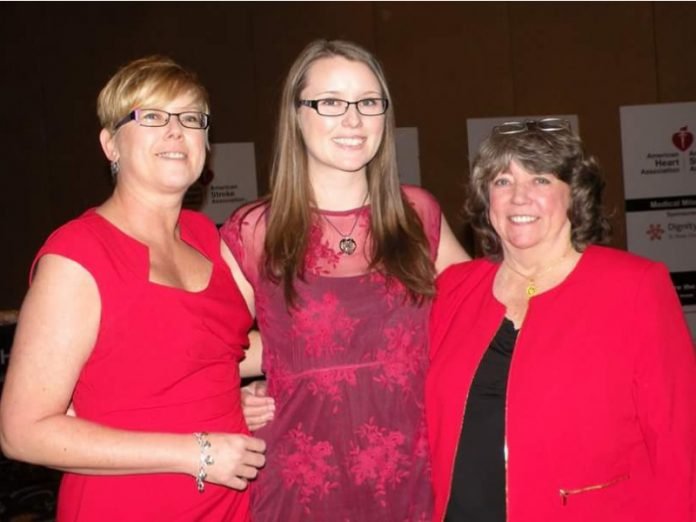
Jeff and Melanie Baldwin were hanging a picture in the dining room of their Las Vegas home when Melanie collapsed.
Jeff grabbed his phone and dialed 911. Preparing for the ambulance to arrive, he closed the bedroom doors to keep their four cats in, unlocked the front door and talked to the dispatcher while giving Melanie CPR that he had learned as a safety manager.
“If he’d been upstairs, it would have been all over,” she said.
Melanie is no stranger to heart trouble. At the time of her cardiac arrest in 2013, she’d had five open-heart surgeries.
“I’m kind of an overachiever,” she said.
As an infant, Melanie looked like a blue-and-pink checkerboard. Doctors knew something was wrong with her heart. They operated when she was 3 and discovered multiple serious problems.
Melanie was born with a condition called aortic stenosis. Her aortic valve had two flaps, not the normal three, and instead of being thin and flexible, they were so thick and stiff that she had only a pinhole for blood to flow through.
Her heart had to work harder, leading to an enlarged heart. She had another operation at 7.
“I never played sports. I never ran, never did anything strenuous as a child,” she said.
Melanie was 19 when doctors replaced her aortic valve with a mechanical one. When she got pregnant at 25, she developed a blood clot despite being on blood thinners. She had to have open-heart surgery while 26 weeks pregnant.
“I thought they both might die,” said her mother, Carol Payne.
Surgeons removed Melanie’s mechanical valve and replaced it with a pig valve, which meant no more blood thinners. Three months later, she gave birth to her daughter, Kate.
A decade later, surgeons replaced Melanie’s pig valve with a titanium valve that is good for 60 years. They also inserted a pacemaker to help her heart pump more efficiently.
“The minute they put it in, I felt so much better,” she said.
Doctors suspect Melanie’s cardiac arrest on Father’s Day weekend in 2013 was caused by an abscessed tooth, which may have led to a heart infection.
Melanie’s rescue proved to be quite dramatic. She was defibrillated eight times before her heart got to a sustainable rhythm.
It took 45 minutes, long enough that doctors in the emergency room were prepared to declare a time of death.
Melanie spent 10 days in the hospital, part of the time with her body chilled to reduce possible brain damage and a breathing tube inserted down her throat.
“Immediately when they took the tube out, she became conscious and you could tell she was going to be fine,” Carol said.
A short time later, Melanie received an implantable cardioverter defibrillator. The device can shock her heart back into rhythm if needed. One afternoon in 2016, it saved her life.
Melanie’s sense of humor is one of the things that has helped her persevere.
“It’s the only thing I’ve got that they can’t take away from me,” she said. “My main point of view in this is the only thing you can control is your attitude.”
It is a message the 54-year-old delivers when sharing her story, something she’s done often for the American Heart Association.
Melanie has volunteered for the AHA by handing out T-shirts or walking in Heart Walks, going to its Heart Ball, speaking at Go Red for Women events and helping post pictures on social media.
“That’s why I give back because the Heart Association is doing so much research, and so much of what they’ve done has affected my life – pacemakers, heart valves and replacements and all that stuff,” she said. “It’s my little way of giving back.”
If you care about heart health, please read studies about red hot meat: the wrong recipe for heart disease and findings of poor bone quality could mean poor heart health.
For more information about heart disease, please see recent studies about selfies could help detect heart disease and results showing that there is a strong link between flu and heart problems.



